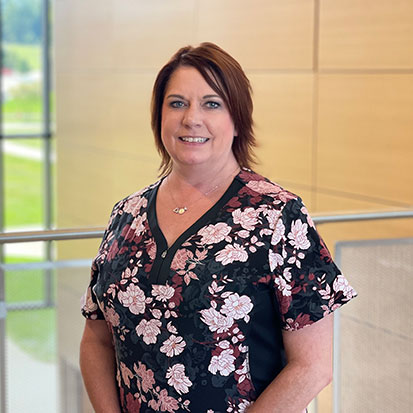
 Learn from the Best
Learn from the Best
Kristin M. Stockbridge, Allied Health Department Chair, Professor/Program Director
“This is a field that I am passionate about, and I think that really helps. To be able to get others excited and passionate about it, that’s rewarding.”
- Medical Assistant
- Medical Coder Biller
- Patient Care Tech
- Medical Office Support
- Phlebotomy Tech
- EKG Tech
- Associate of Applied Science – Allied Health
- Teaching at Jackson College since 2010
- 2016 Outstanding Faculty Award winner
Kristin M. Stockbridge, PhD, MBA, BHSA, CMA(AAMA), RMA(AMT), AHI(AMT)
Today, Dr. Kristin Stockbridge teaches and guides programs that help many students enter the allied health fields. At first, she didn’t plan on working in health care.
After starting college, she left to work various jobs, including receptionist/billing clerk for a doctor’s office. She enjoyed the office environment but realized that medical assistants were able to provide greater value than she could as the person seeking payment. She returned to college to study medical assisting.
“I was the one nobody ever thought would be in health care. Then I realized I loved it,” Stockbridge said.
Finding the perfect fit
After experience as a medical assistant in many practices, an unexpected layoff led her in a new direction. While having a garage sale, she ran into her former teacher, who suggested that she try teaching. She did and found a new way to help people.
Stockbridge came to Jackson College in 2010 to teach and coordinate the medical assistant program. In addition, she’s created new allied health programs and chairs the allied health department. “This is a field that I am passionate about, and I think that really helps,” she said. “To be able to get others excited and passionate about it, that’s rewarding.”
Teaching today’s students
In recent years, she helped create the College’s first competency-based program, medical insurance coder biller. She modified the medical assistant program to a hybrid format, using simulation and online activities to learn the material in place of a traditional lecture. Class time is spent doing activities and practicing skills, allowing students to come to campus just one or two days a week maximum.
“I have students from ages 20-60, with every student at a different place in their life but starting something new here. To see people from all walks of life get excited or inspired, I know that even if I’m no longer directly working in health care, I am still able to help people,” she said.

